Federal election 2019: Reaction to Labor’s climate change action plan
Grocery bills could soar with food manufacturers included in Bill Shorten’s pay to pollute plan; demand for electric cars could zap the national grid; meet the ex-Labor voting Scott Morrison who gives Mr Shorten a spray; Labor energy plan ‘a bad deal’ for car salesmen; and, land clearing law plan gets Barilaro’s goat. FEDERAL ELECTION WRAP
NSW
Don't miss out on the headlines from NSW. Followed categories will be added to My News.
- Federal budget 2019: Big roads, highways investment for NSW
- Federal election 2019: Labor calls for major electric car boost
Household grocery bills are in line to soar with major food manufacturers included in Bill Shorten’s aggressive plan to make businesses pay to pollute.
Arnott’s, Bega Cheese, Ingham’s, McCain, Nestle, Parmalat, Coca-Cola, Pepsi and the Australian Lamb Company are among 250 businesses that would be forced into Labor’s rebooted carbon trading scheme.
The move has taken the $132 billion industry by surprise, with the Australian Food and Grocery Council (AFGC) warning of “unintended consequences” of the policy given the cost pressures already making it tough to keep food prices low.

FEDERAL BUDGET NEWS
Federal budget: Power bill gift for 4 million vulnerable Aussies
Federal budget: What we know so far
Federal budget: $530 tax offset boost for millions of Aussies
Federal budget: Labor vows fiscal review ahead of surplus
Mr Shorten on Monday announced Labor would set strict new emissions limits on all businesses that release more than 25,000 tonnes of carbon dioxide each year, in a bid to meet his pledge to reduce emissions across the economy by 45 per cent over the next decade.
Energy Minister Angus Taylor labelled Labor’s policy a “lunch box tax” given at least 15 food and beverage companies were among the 147 businesses facing emissions caps.
“We’ll all pay for Labor’s hit to business, particularly mums and dads and their household pantries,” Mr Taylor said.
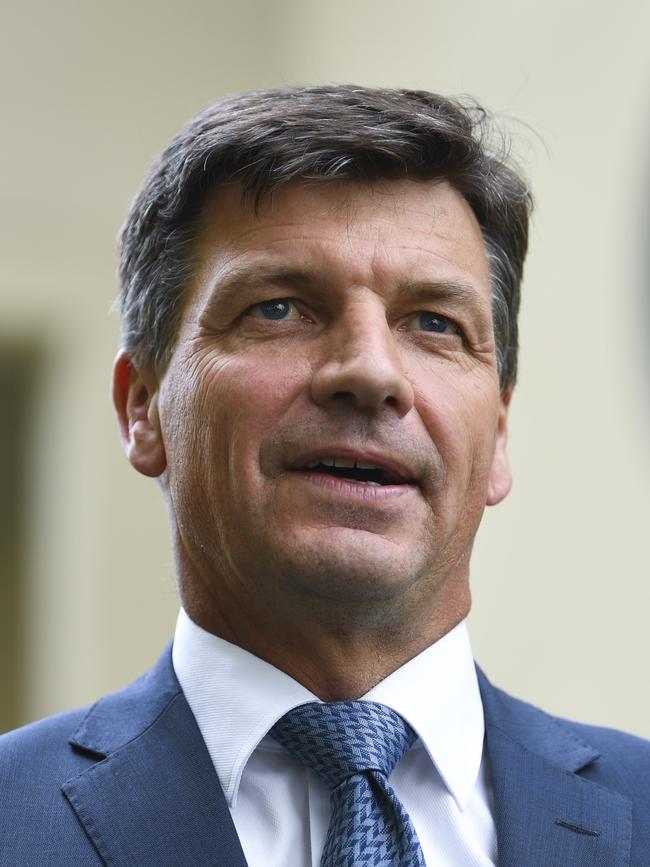
“With companies like Aldi, Arnott’s, Bega, Coca-Cola, Ingham’s, McCain, Nestle, Pepsi and Wrigleys now in Labor’s sights the cost of the average lunch box will go up and up and up.”
Labor’s cap and trade scheme expands on the Coalition’s existing safeguard mechanism, which sets emissions limits on 108 businesses operating at 211 sites that pump more than 100,000 tonnes of CO2 into the air.
But the Coalition’s mechanism has been widely regarded as ineffective in reducing pollutions because the current emissions caps were so high that only about a dozen companies bought carbon credits last financial year.
Other organisations to face caps if Labor is elected include NSW Trains, Wagga Wagga City Council, Wollongong Coal, Blacktown Waste, Sydney Water and Crown Resorts.
AFGC chief executive Tanya Barden said that Australia’s largest manufacturing sector was already heavily investing in energy efficiency measures and any policy change could have “unintended consequences”.
A spokesman for Nestlé said the company, which last year pumped out 36,303 tonnes of CO2, had been working hard to reduce emissions for many years.
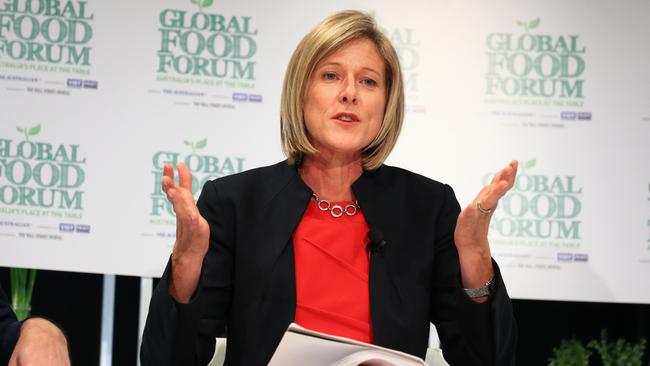
Asked whether Labor had modelled the economic impact of its policy, energy spokesman Mark Butler pointed to advice prepared for former prime minister Tony Abbott, which showed economic growth of about 23 per cent under both a 45 per cent reduction and the Coalition’s 26 per cent target.
“If anything, energy costs under our target will be lower because there’ll be a much bigger drive into energy-efficiency,” Mr Butler said.
Electric car plan could overload national electricity grid.
The ALP’s radical green plan for half of all new cars to be electric in just over a decade’s time would put “unprecedented demand” on the nation’s electricity grid and push it to “its operating limits”, electricity experts say.
As major questions emerged about the price-tag and practicality of Labor’s electric dreams, industry estimates provided to a senate inquiry claimed it would cost billions to install enough charging stations to keep electric vehicles on the road.
Peak body Energy Networks Australia said there would be potential problems for the power grid in the event of the widespread take-up of electric vehicles.
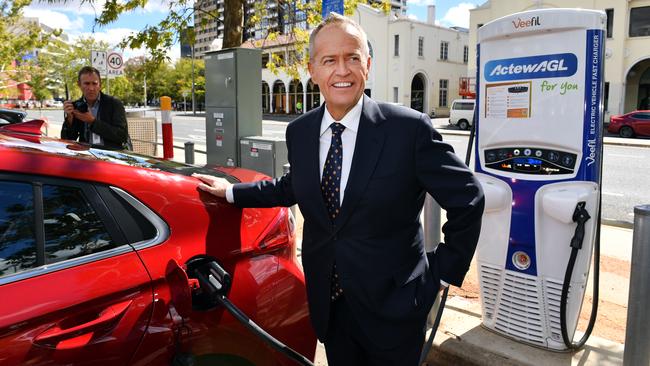
During peak week nights in hot weather, when people arrived home from work between 5pm and 6pm and charged their cars, the demand would exceed suburban network capacity “causing poor reliability”, it told the senate inquiry last year.
“This may push the grid to its operating limits, hence requiring upgrades to substations and transmission infrastructure,” it said.
Infrastructure Australia said peak electricity already occurred in the evening as “people arrive home and turn on lights, airconditioners and cook their meals”.
It estimated running an electric vehicle charger at 7kW was like having “two kettles constantly on the boil” while a fast charger was even more power-hungry.
“A DC Fast Charger 350kW ultra-fast charger requires on-demand power similar to an industrial facility, and will place demands on the local network, especially when delivered at scale,” it said.
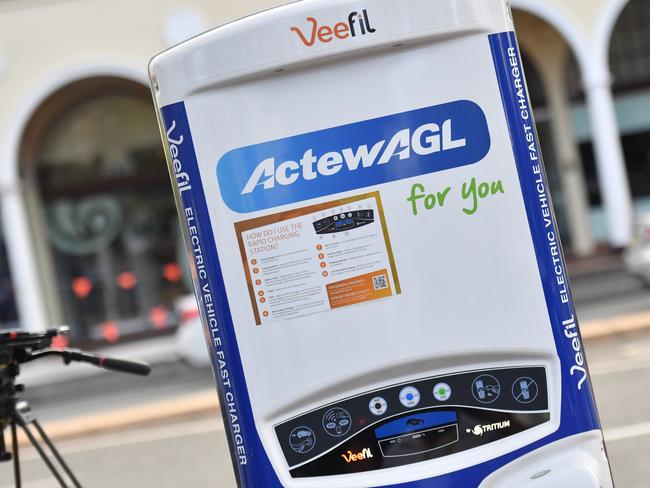
MORE FEDERAL ELECTION NEWS
Vanessa Petrie: Why electric cars will be worth the switch
The senate inquiry was told analysis showed the daily energy required to charge some electric vehicles was up to half the energy consumption of an average house.
“Without careful planning, an electrified fleet of vehicles will place additional demands on the grid,” Infrastructure Australia said. “As a result, additional network infrastructure would need to be upgraded to cater for the increased load of electric vehicles. A cost which is inevitably worn by consumers and taxpayers.”
The inquiry also heard evidence that if every household owned one electric vehicle, average electricity demand per household could increase by between 25 and 43 per cent.
Energy Networks Australia said the nation’s “distribution networks were not designed for any significant uptake of electric vehicles and the consequential demand for charging”.
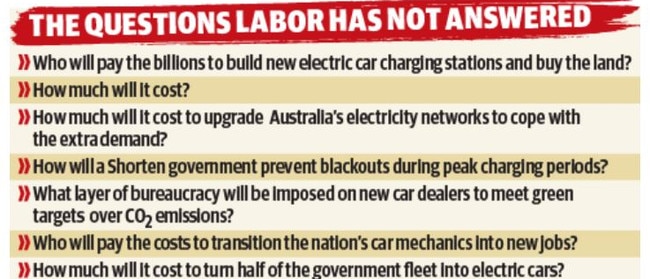
It estimated 28,370 fast charge DC (direct current) “hoses” would need to be built across the country in the years leading to 2040, at a cost of nearly $1.7 billion, not including land costs.
Fast Cities Australia estimated the optimal spacing for an ultra-fast charging network would be 150km, and a network of this type would cost a minimum of $100 million.
The senate crossbench committee, which released the report earlier this year, said the uptake of electric vehicles had been slow in Australia, with concerns raised by motorists about the cost, driving range and the lack of recharging infrastructure.
In California, to meet a radical target to make the economy carbon neutral by 2045, electric vehicles have been heavily subsidised and now account for 10 per cent of car sales. The state has handed out $850 million in rebates for 270,000 electric vehicles, with buyers given big tax credits.
In January the NSW government announced $3 million in funding to co-invest in fast-charging infrastructure on major regional roads and $2 million for charging points in commuter car parks. It also has plans to buy electric vehicles for the government fleet.
Some councils in Sydney have already begun replacing their petrol and diesel vehicles with electric cars and installing charging stations. Canterbury Bankstown Council is planning to buy 10 electric vehicles by the end of the year.
— Clarissa Bye
Namesake bush battler Scott Morrison gives PM a spray
Scott Morrison has voted Labor most of his life but now thinks politicians in Canberra can easily forget about battlers like him in the bush.
The Lithgow spray painter, who works on coal trains, shares a name with the Prime Minister — and his thoughts on Labor probably mirror that of his namesake.
The 44-year-old says Labor has moved too far to the left and risks leaving behind families who rely on the coal industry in his town.
Hundreds of local full-time jobs were lost in Lithgow when the Angus Place coal mine and the coal-fired Wallerawang power station both shut down in 2014.
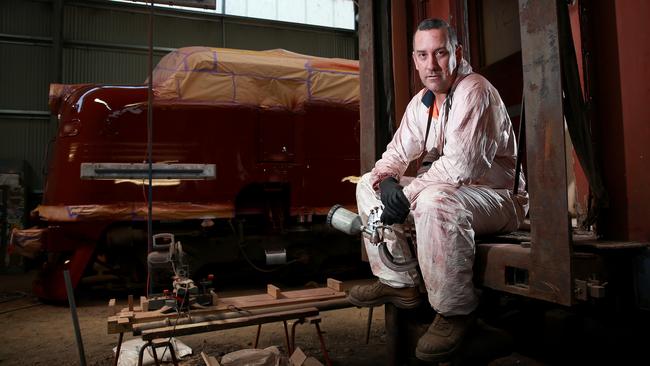
Mr Morrison says it is policies such as Bill Shorten’s plans to cut greenhouse gas emissions by 45 per cent over the next decade that have prompted him to abandon Labor.
“Coal mines have closed down, which has hurt the town. There’s not much other work around — Lithgow is a coal mining town, that’s basically what it was built for,” he said.
“Lithgow used to be 100 per cent Labor, but people have lost a lot of faith in them because they’ve pushed too far to the left and the Greens.
It’s cost people too many jobs and people think they’ve turned their back on them. Now they’re voting for the Shooters party — they’re really the only ones out here who care about country people, care about jobs.”
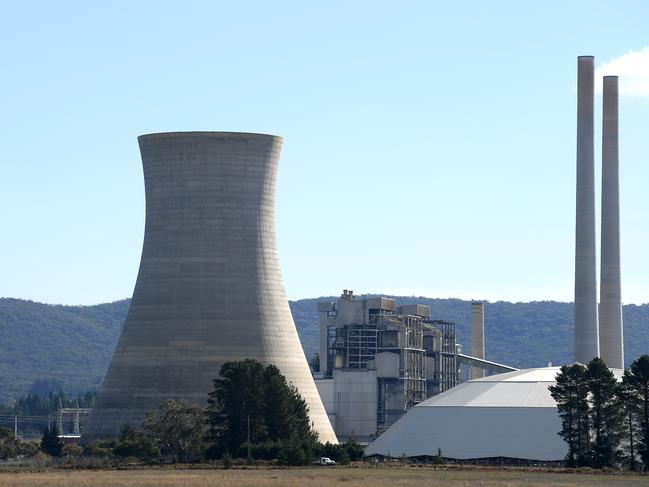
Mr Morrison said he voted for the Shooters party in the state election and would again look to vote for either the Shooters or an independent in the federal election.
“(Labor) have come out and said they’re going to shut down power stations. If they start to shut down power stations, where are they going to get power from? It’s already been proven that wind and solar power in South Australia doesn’t work. Maybe in 50, 100 years when the technology develops,” he said.
“There’s two power stations (here) one has been mothballed and demolished … the government could have pumped money into and got it into a cleaner burning new power station. China is building 200 of them, why couldn’t they do that here?”
— Derrick Krusche
Bill’s energy plan ‘a bad deal for us’: vehicle sellers
Australian new car dealers have rejected ALP leader Bill Shorten’s plans to make them responsible for policing CO2 emissions on petrol cars — saying it’s a job for car makers.
The radical green plan proposed by Labor would force new car dealers to sell more electric cars and cars with lower CO2 emissions in order to meet a new government imposed “emissions standard”.
Australian light cars average about 192g of carbon dioxide in emissions per kilometre.
As part of the ALP policy on climate change, it wants to cut this down to 105g of CO2, producing less greenhouse gases.
Under the Labor policy unveiled on Monday, car dealers would be forced to regulate the policy by making them “meet the standards by offsetting high emissions car sales with low or zero emissions car sales — such as electric vehicles”.

The peak body for car dealers says this does not occur overseas. Australian Automotive Dealer Association chief executive David Blackhall said the body was concerned over the “reference to these standards applying to car retailers” as dealers can only “sell the cars that are supplied to them”.
“It’s simple, the company that makes the product should be responsible for meeting the standard,” he said.
The Climate Change Authority estimates the cutting the carbon dioxide in petrol cars would add $1500 to the price of a new car, but says in the long run the vehicle will use less petrol as a result and thereby pay for itself.
Mr Shorten claims his mandated target of 105g of CO2 per kilometre for light vehicles is a “sensible standard which will bring Australia’s cars into line with those in the US”.
But in the US, Donald Trump has just wound back a plan by his predecessor President Obama to cut emissions to 116g/km for tailpipe emissions. Instead, he is planning for 147g/km, sparking a fight with California.
— Clarissa Bye
Barilaro slams Labor land clearing laws plan
Deputy Premier and NSW Nationals leader John Barilaro has slammed Bill Shorten’s plans to roll out land clearing laws similar to those in Queensland warning they will “punish farmers” and lock up productive agricultural land.
The federal Labor Leader on Monday announced his plan to tackle climate change would include controversial new laws to “bring broadscale land clearing under control”.
“Where states properly regulate land clearing, such as Queensland, Labor will take no action,” the policy documents state.
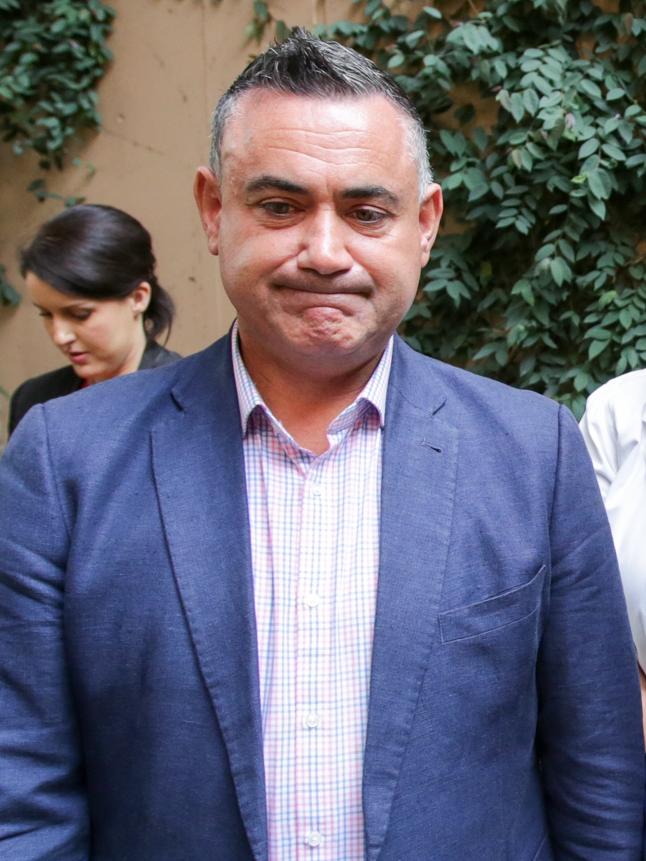
Queensland farmers cannot clear land that has not been touched for 15 years, instead of the previous 28 years, leaving them millions of dollars out of pocket in land value alone.
Mr Barilaro said the Coalition wouldn’t stand for “irresponsible legislation that threatens to turn our farmers into criminals”.
The NSW government introduced a new land management framework in 2017 allowing the removal of paddock trees and native vegetation from small areas in exchange for setting aside areas containing remnant vegetation.
It also enables farmers to remove invasive native species that dominate an area.
“Bill Shorten’s proposed legislation will punish farmers at a time when they are desperately hanging on for rain,” Mr Barilaro said.
NSW Farmers’ Conservation and Resource Management chair Bronwyn Petrie said while the current laws weren’t perfect the organisation would “fight tooth and nail” for their retention under any national scheme.
She said “proper, practical” land management is used now.
— Danielle Le Messurier
Speeding to a budget blackhole on excise
Labor is speeding towards a multi-billion dollar Budget blackhole after Bill Shorten ruled out increasing the rate of fuel excise to make up for lost revenue under his ambitious electric vehicle plan.
Labor has left the door open to investigating controversial road user charges — based on how far and what roads motorists use — to make up for the lost revenue under its plan to boost electric car sales to 50 per cent of all new vehicles by 2030.
Fuel excise pumps about $17 billion into the federal coffers each year — $6 billion from petrol and $11 billion from diesel.
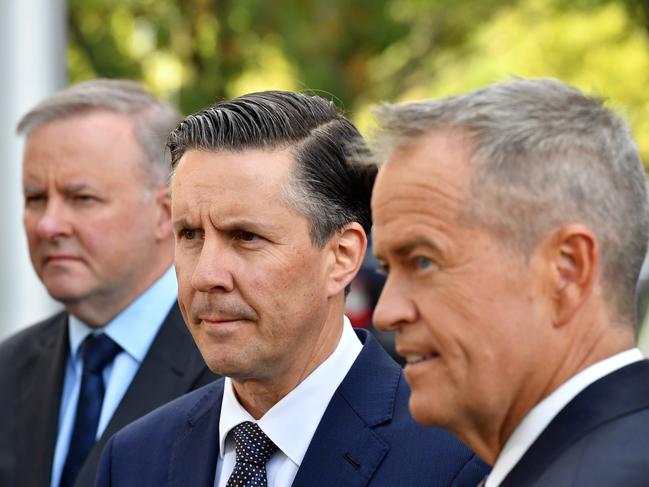
When asked about the possibility of road user charges Mr Shorten confirmed a Labor government was “not touching the fuel excise” and then deferred to Opposition infrastructure spokesman Anthony Albanese.
Mr Albanese said that Labor had supported a Coalition push to investigate road user charges but that the government had dropped the ball on the issue.
In a clear indication Labor was open to the issue, he said such an inquiry was just “baby steps” towards “what the future looks like” if road user charges were implemented.
— Sheradyn Holderhead & Clarissa Bye


